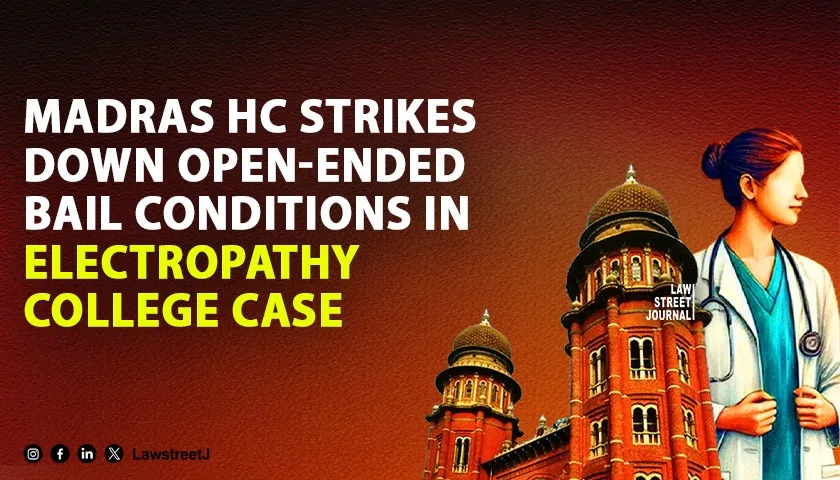Chennai: The Madras High Court has set aside a bail condition that required the founder of a private electropathy college to keep depositing additional funds “as per requirement” for refunding student fees, holding that such an open-ended financial obligation cannot be tied to bail.
The court of Justice L. Victoria Gowri delivered the ruling while modifying conditions imposed by a Virudhunagar Sessions Court on the principal accused in Crime No. 87 of 2025.
The case stems from allegations that the institution was conducting unrecognised courses, including a 4½-year programme branded as a “Bachelor of Electro-Homeopathy Medicine,” collecting large sums from students, and misrepresenting its affiliations. Following unrest on campus, the Sessions Court had granted bail subject to several conditions, including the deposit of ₹40 lakh with the District Legal Services Authority (DLSA) to facilitate refunds for students opting to discontinue. Subsequent deposits by co-accused increased the corpus to ₹51 lakh.
While examining the revision petition filed by the college founder, the High Court noted that refund-related arrangements had been introduced at a time of student agitation and were intended to stabilise the situation. More than 200 students had already received reimbursements from the DLSA. These steps, the Court said, could continue in a limited and supervised manner without determining liability. However, the direction compelling the accused to make further deposits whenever the corpus fell short was found to be excessive and unrelated to the legitimate aims of bail.
Justice Gowri held that such a condition risked transforming bail into “a running restitutionary mechanism” and would effectively pre-judge civil or criminal responsibility. Bail, the order reiterated, must ensure presence and prevent interference with the process, not serve as a vehicle for indefinite monetary recovery during an ongoing investigation.
The Court therefore removed the replenishment requirement and ordered that the remaining amount of ₹10.2 lakh, together with accrued interest, be placed in a short-term deposit in the name of the Principal District Judge-cum-Chairperson, DLSA, Virudhunagar, tagged to the criminal case. It further held that refunds for students who voluntarily withdraw from the institution may continue, but only from the existing corpus and interest, after basic documentary verification and notice to the investigating officer and the petitioner.
However, the other bail conditions — including execution of bond, cooperation with the investigation, and restrictions relating to course nomenclature and representations made by the institution — were left undisturbed. The Court also recorded the long-standing policy position of the Union Government that electro-homeopathy is not recognised as a system of medicine and noted that the ongoing ambiguity has contributed to recurring disputes.
The criminal revision was therefore allowed in part.
Case Title: Tikat Jackson @ Diccot Jeckson vs. State of TN and Others




![TN Medical Council declares change of gender identity of LGBTQIA+ as misconduct [Read Notification]](/secure/uploads/2022/12/lj_5268_5cebb05a-97fb-40fb-8045-25cdf8f4207a.jpg)
![Madras High Court Directs Tamil Nadu Government to Ensure Quota for Transgenders in Local Body Elections [Read Order]](/secure/uploads/2023/08/lj_2507_7a03d113-08b1-4670-b6fb-9058aee481d0.jpg)
![Anti Corruption sleuths acted like "puppets in The Muppet Show", HC notice to ex TN CM in disproportionate assets case [Read Order]](/secure/uploads/2023/09/lj_8675_7b37fc02-1b2d-4f4a-9816-3df20545b37e.jpg)






